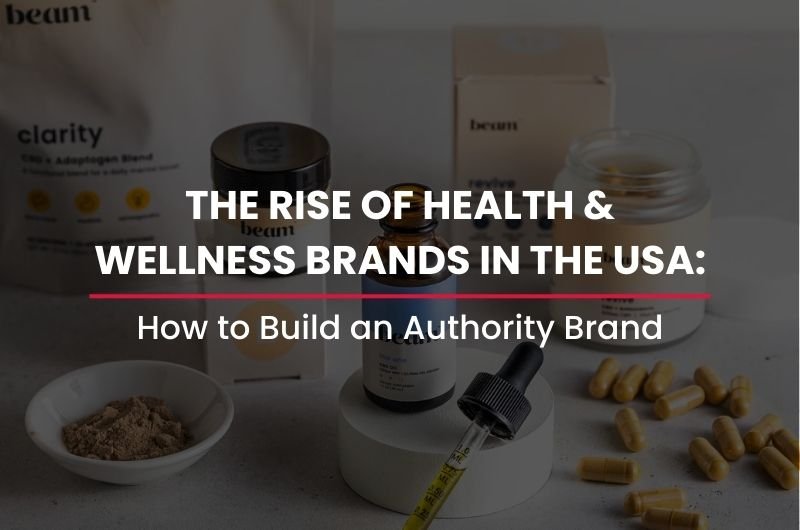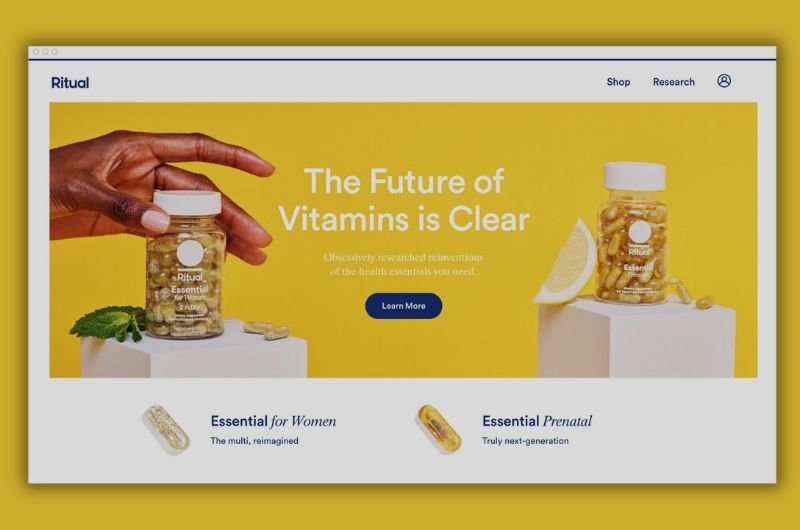The Rise of Health & Wellness Brands in the USA: How to Build an Authority Brand

Introduction: The Boom of Health & Wellness in the USA
The health and wellness industry in the USA is booming. With increasing consumer awareness about self-care, fitness, and holistic well-being, the demand for high-quality health and wellness products is at an all-time high.
However, building an authority brand in this competitive market requires more than just a great product—it demands strategic branding that establishes trust, credibility, and long-term loyalty.
Why the USA’s Health & Wellness Market is Growing Rapidly?
Before we dive into brand-building strategies, let’s first understand why the health & wellness industry is expanding so fast:
- Growing Consumer Awareness – More Americans are prioritizing their health, from organic food choices to mental wellness programs.
- Rise of Digital & E-commerce – Direct-to-consumer (DTC) brands are making health & wellness products more accessible than ever.
- Influence of Social Media & Thought Leaders – Consumers trust wellness influencers, reviews, and educational content when choosing brands.
Now, the challenge for brands is not just to enter the market but to stand out and dominate. Let’s explore how you can build an authority brand in this space.
Let’s break down exactly how to build an authority brand in the health and wellness space.
1. Define a Clear Brand Purpose
If your brand exists just to sell, it won’t last. People connect with brands that stand for something bigger.
Ask yourself:
- What’s the deeper mission behind your brand?
- How does your brand contribute to people’s well-being?
- What does your brand stand against?
Take OLLY for example. Instead of just selling vitamins, they made supplements fun, easy, and approachable—challenging the outdated, clinical image of the supplement industry.

Action Tip:
Craft a brand story that makes people feel something. Your purpose should be clear in your messaging, packaging, and content.
2. Nail the Science & Transparency
Today’s health-conscious consumers are smart—they read labels, research ingredients, and question claims. If you aren’t transparent, you won’t earn their trust.
- What you can do:
- Back up your product claims with real science and research.
- Make ingredient sourcing clear—organic? Fair trade? Non-GMO? Tell them!
- Use your blog, emails, and social media to educate your audience.
Example:
Seed became a trusted probiotic brand by making gut health education their priority. Their content breaks down complex science into easy-to-understand insights.

Action Tip:
Seed became a trusted probiotic brand by making gut health education their priority. Their content breaks down complex science into easy-to-understand insights.
3. Craft a Distinctive Brand Identity & Experience
Think about the brands you love. What makes them unforgettable? It’s their branding, messaging, and overall experience.
Branding Checklist:
- Visual Identity: Clean, modern, and trustworthy design
- Messaging: Clear, confident, and easy to understand
- Customer Experience: Smooth website, great support, and fast shipping
Example:
Ritual (a vitamin brand) nailed it with transparent capsules, a science-backed voice, and a clean, minimalist aesthetic. Their branding screams credibility and premium quality.

Action Tip:
Your brand should be instantly recognizable. Invest in a strong identity that makes people trust you at first glance.
4. Build Thought Leadership Through Content & Community
Want to become the go-to brand in your niche? You need to show expertise and leadership.
Ways to Establish Authority:
- Start a blog or podcast about industry trends, expert interviews, and wellness tips
- Collaborate with influencers, nutritionists, or fitness experts to boost credibility
- Use storytelling—share customer success stories and your brand journey
Example:
Four Sigmatic (a mushroom-based wellness brand) educates its audience through blogs, social media, and video content, making them the go-to brand for adaptogens.

Action Tip:
Share high-value content that helps people trust your expertise before they even buy from you.
5. Leverage Social Proof & User-Generated Content
People trust other people more than they trust ads. Showcase real results, testimonials, and user-generated content to build credibility.
What works best:
- Before-and-after results
- Video testimonials from real customers
- Unboxing and review videos from influencers
- User-generated content (people tagging you on social media)
Example:
Athletic Greens thrives on testimonials from athletes and health enthusiasts who swear by their product.

Action Tip:
Encourage happy customers to share their experience online—this builds trust and credibility fast.
6. Prioritize Sustainability & Ethical Practices
Today’s consumers care about more than just what they consume—they care about how it’s made.
Ways to Stand Out:
- Use eco-friendly packaging to reduce waste
- Highlight ethical sourcing (fair trade, cruelty-free, organic, etc.)
- Support wellness-related causes and sustainability programs
Example:
Dr. Bronner’s (a soap and personal care brand) built its authority by committing to organic, fair-trade ingredients and social activism.

Action Tip:
Make sustainability part of your brand story—it matters more than you think!
Important Terms Explained:
Final Thoughts
The USA’s health & wellness industry is growing fast, but only brands that build trust, differentiate themselves, and create strong brand authority will dominate. Whether you’re a startup or an established wellness brand, the key to success lies in branding, credibility, and consumer engagement.
As the health and wellness space continues to evolve, the brands that truly break through are those built on clarity, strategy, and consistency — not just good design. At The Empror, we’ve worked with purpose-driven businesses to craft brand identities that do more than look good — they lead. Whether you’re launching a wellness startup or repositioning an existing one, our strategy-led brand design for U.S. DTC brands helps you carve out a space you can own and defend in a competitive market.
